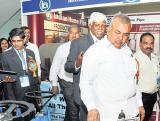 No amount of technical solutions can help in meeting the increasing demand for water in the City, according to P Balaram, the director of Indian Institute of Science (IISc).
No amount of technical solutions can help in meeting the increasing demand for water in the City, according to P Balaram, the director of Indian Institute of Science (IISc).
Only conservation and equitable distribution of water supply would address the problem.
“Although technical solution is the need of the hour to utilise the existing water resources, there is no escape from standard exercises of conversational activities. Even at IISc, more stress is laid on research on water,” Balaram said on Friday at the 46th annual convention of the Indian Water Works Association (IWWA), being held for the very first time in Bangalore.
Prof Balaram said that while newer technologies should be adopted, government bodies, consumers and other stakeholders must not shy from water conservation. He then recalled how water was being supplied round the clock in 1980s and how it was rationed subsequently because of growing population.
Bangalore Urban district In-charge Minister Ramalinga Reddy mentioned that nowadays every household expected drinking water in their taps round the clock. The engineers and other professionals, the consultants and contractors working in the sector should always keep in mind that the government had to meet the requirements of even the poorest man — from drinking water to sanitation facilities at his home.
Reddy said that drinking water to 110 villages, part of the BBMP, would be supplied after the proposed allocation of 10 tmc (thousand million cubic feet) of water from River Cauvery. This would also reduce the pressure on ground water, he said.
At the event, T Venkataraju, the BWSSB Engineer-in-Chief, took over as IWWA chairman from V R Kalyankar.
Dr Sukumar Devotta, former director of the National Environmental Engineering Research Institute, delivered the Dr Modhak Memorial Lecture on ‘Augmentation water availability from non-conventional water resources’. He explained how zero liquid discharge, which is mainly recycled and reused, has been made mandatory for leather, textile and dyeing industries in Tamil Nadu and how it has helped conserve water.
BWSSB Chairman M D Ravi Shankar, in Raman Endowment Lecture, explained the board’s services to the urban poor.


